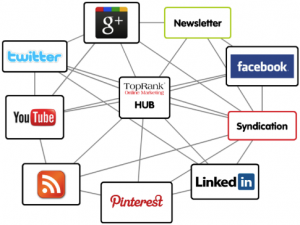 In a few weeks I’ll be giving a talk at the University of St Thomas in Minneapolis to a class on community management on a topic that I think will interest many of our readers.
In a few weeks I’ll be giving a talk at the University of St Thomas in Minneapolis to a class on community management on a topic that I think will interest many of our readers.
Online Community Management is a function that has existed in the digital world for a while now, stretching back to the days of bulletin boards and online forums. Today that role looks a bit different.
Not be confused with a Social Media Manager, a Community Manager is typically the “voice of the brand” on the social web as well as the voice of the community back to the brand. Functionally, this translates to social media listening and engagement but also includes some promotion of brand messaging.
The growth and popularity of social media has exploded the audience and participation of public online communities, so the need for people skilled in the art and science of community management has also increased. Since some of the Community Manager responsibilities cross over into brand content promotion, that’s where this post is focused.
Key Considerations for Community Manager Content Promotion:
Topics – How does the brand want to be known? What is it already know for? What topics represent the value the brand delivers for customers and the broader community? When it comes to being the “best answer” for questions that the community has, what topics or even keywords describe those questions and answers?
Some of the topics can be determined by answering those questions and many more will be revealed during the course of working with the community. The starting point is, “What does your brand stand for?” and “What does your community care about?”. Those topics can be mapped to key objectives for the brand and how involvement with a social media or online community will help the brand reach those goals.
Content Sourcing – Guided by a list of topics that represent the goals of the brand and the community, content promotion sources can be identified and filtered. The Marketing people will be (or should be) feeding Community Managers with information on planned company marketing, PR and communications events. An over Content Marketing Plan and Calendar can do this pretty effectively.
From a tactical perspective, content sourcing for a Community Manger can involves a mix of content types, such as:
- Community Content Curation
- Industry Content Curation
- Brand Message Promotion
- Brand Content Curation
- Crowdsourcing Community Content
There are many sources to look for these types of content from using search engines (news, image, blog) to industry newsletters, to searching social networks for trending topics. The most basic and effective source of content is the community itself. Create a cycle of asking them questions, aggregating answers and recognizing their participation. Check out this post for multiple creative content sourcing ideas.
Editorial Calendar – Planning social content is a mix of pre-determined topics and content types as well as allowing for dynamic and spontaneous content based on events and opportunities. Here’s a blog content calendar template that includes:
- dates
- topics
- titles
- description
- target audience
- buying cycle
- keywords
- categories
- promotions
- repurposing
- media types
- internal citations
- 3rd party citations/sources
Hub and Spoke – For many companies, the most practical model for content and social media where a blog serves as the hub and social networks are the spokes. There are other models depending on the social media maturity level of the brand and community, but hub and spoke is an effective starting point.

Social Content Optimization – Search is priceless for connecting brand social content with people who are actively looking. For Community Managers, that means being provided with a keyword glossary from the SEO team. Keyword Glossaries are a tool to help you understand what phrases are high in demand. Armed with a list of keywords mapped to brand content and sorted by popularity, Community Managers can make word choices to improve attraction of search traffic without compromising the message.
Social Content Promotion – The best rule of thumb for social content promotion is to only share what’s worth sharing – whether it’s brand, community or industry content. When a marketing manager ask for some lame thing to be tweeted, plussed and posted to the Facebook Fan page – just say no. And explain what qualifies as “promotable” content that adds value to the community. Social content promotion can be a slippery slope and brands will only reap what they sow. Creating value first, empathizing with the community and being creative with brand promotion are all essential. Here’s a great post on promoting social content that also helps make it more findable.
Social Content Repurposing – On a daily basis, some social content like a Tweet might be reasonably repurposed for sharing on LinkedIn, Google+ and Facebook. Some might be duplicates. Some might be longer or more visual representations of the original. What will work for your community might not work for others, so test and observe.
A classic example of repurposing:
- Curate industry statistics
- Post one statistic every day or once a week to the corporate Twitter account, or LinkedIn, or on an image to Google+ or Facebook
- Leverage said statistics in the company newsletter, blog posts and in presentations
- Compile statistics into a blog post
- Create a PPT using dramatic images with the stats in a clever font – promote on Slideshare, embed on blog
- Create an infographic using these statistics – break the infographic down into PPT slides and share on Slideshare
- Create a video with statistics illustrated on top of B-roll video clips and promote on YouTube, embed on blog
- Conduct short interviews with industry thought leaders where their opinions on the curated statistics drives the questions – publish on blog
- And so on and so on…
It is not advisable to repurpose using all of these tactics, as the duplication would alienate your community. But this should give you some ideas on repurposing.
Monitoring & Measurement – Goals drive measurement and there are a variety of performance measures for building and engaging with a community. When it comes to social content promotion, quantitative measures of reach and qualitative measures of engagement are worth tracking at daily, weekly and longer term intervals. Short term tracking reveals opportunities and direct impact. Longer term tracking helps identify overall trends.
I’m going to stop here, because this was supposed to be a quick 500 word post and I see it’s now over 1,000!
I’ll leave you with a question though: To what degree should Community Managers be expected to promote brand social content?
Photo: Shutterstock


